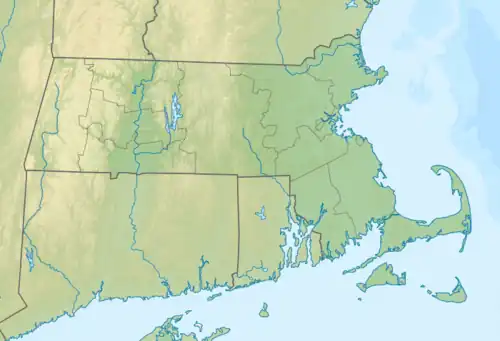| Great Marsh | |
|---|---|
| Great Salt Marsh | |
 | |
 Great Marsh | |
| Location | |
| Coordinates | 42°44′07″N 70°49′08″W / 42.735277°N 70.818914°W |
| Type | Saltmarsh |
| River sources | Parker River |
| Ocean/sea sources | Atlantic Ocean |
| Surface area | 20,000–30,000 acres (8,100–12,100 ha) |
| Salinity | Salt Water |
| Frozen | Salt water Lake |
| Islands | Plum Island |
| Settlements |
|
The Great Marsh (also sometimes called the Great Salt Marsh[1]) is a long, continuous saltmarsh in eastern New England extending from Cape Ann in northeastern Massachusetts to the southeastern coast of New Hampshire.[2] It includes roughly 20,000–30,000[2][3][4] acres of saltwater marsh, mudflats, islands, sandy beaches, dunes, rivers, and other water bodies.[2] The Great Marsh comprises much of the northeastern half of Essex County, Massachusetts, and touches the towns and cities of Gloucester, Essex, Ipswich, Rowley, Newbury, Newburyport, and Salisbury in Massachusetts as well as the towns of Seabrook and Hampton in New Hampshire.[5][6] It is a designated Important Bird Area.[1]
References
- 1 2 "Great Salt Marsh". BirdLife International. Retrieved 5 June 2018.
- 1 2 3 "The Great Marsh". Great Marsh Coalition. Great Marsh Coalition. Retrieved 5 June 2018.
- ↑ "Great Marsh ACEC". Mass.gov. Commonwealth of Massachusetts. Retrieved 5 June 2018.
- ↑ "Site Summary: Great Marsh". Mass Audubon. Massachusetts Audubon Society. Retrieved 5 June 2018.
- ↑ "Great Marsh Coastal Adaptation Plan". The National Wildlife Federation. The National Wildlife Federation. Retrieved 5 June 2018.
- ↑ "Hampton Brochure" (PDF). NH Audubon. New Hampshire Audubon Society. Retrieved 5 June 2018.
This article is issued from Wikipedia. The text is licensed under Creative Commons - Attribution - Sharealike. Additional terms may apply for the media files.